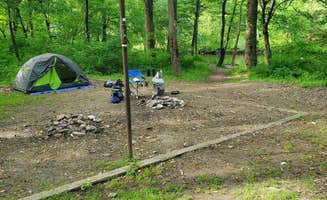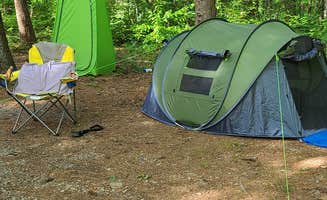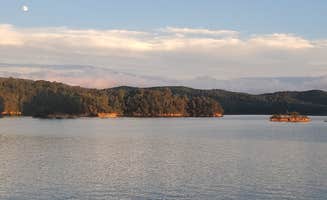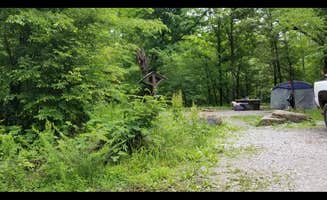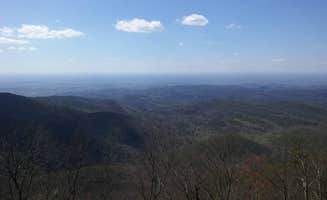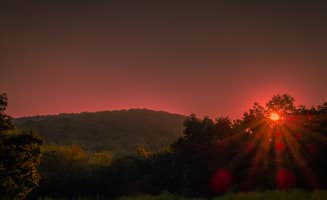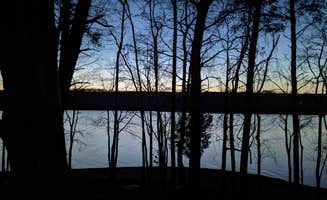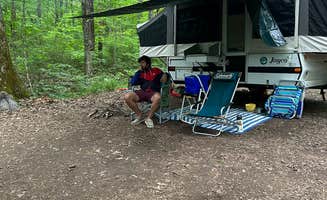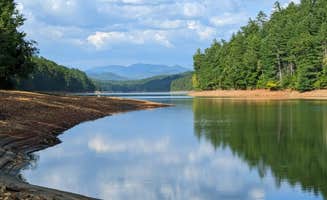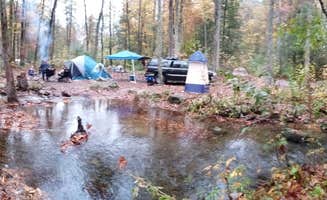Dispersed camping near Cleveland, Tennessee offers primitive sites in the Cherokee National Forest, primarily along forest roads at elevations between 1,200-2,500 feet. Most free camping areas require traveling gravel roads that can be challenging after rain, with camping concentrated in creek valleys. These sites typically have limited amenities and become busiest from April through October when temperatures range from 60-85°F.
What to do
Creek exploration: Near Lost Creek Campground, shallow water areas provide natural recreation. "The highlight would definitely be the creek. There are spots that you can swim around in," notes one camper. The creek areas remain accessible year-round, though water levels vary seasonally.
Hiking trails: The Benton McKaye trail passes directly beside Lost Creek Campground, offering day hiking options. "The Benton McKaye trail running directly beside it," mentions one reviewer. For more challenging terrain, explore Jack's River Falls Trail, where "This is a tough trail but good for teens looking to challenge themselves in the back country. The views are amazing with rock falls."
Fishing opportunities: Many creek-side campsites provide fishing access. At Prentice Cooper State Forest, campers report success with "Caught 4 largemouth bass in about 15 minutes of fishing on the pond, largest being about a 1lb." Bass fishing is productive in warmer months, while trout fishing peaks in spring and fall.
What campers like
Remote locations: Goforth Creek Campground offers backcountry camping near water. A camper shares: "The site has really easy access to water for purifying or swimming. There is also a very large established fire pit." These sites often require short hikes but reward with solitude.
Clear water access: The Conasauga River Camp features exceptional water clarity. "Lovely little spot next to a very swimmable and warm crystal clear river - very popular with locals, and I imagine would be packed on weekends," reports one visitor. These river sites provide natural swimming holes during summer months.
Quiet atmosphere: Wilderness dispersed sites deliver genuine solitude. One camper at Prentice Cooper notes, "If you want seclusion, this is your spot!" While another describes the Lost Creek area as "incredibly clean + quiet." Most remote sites have virtually no light pollution, making them popular for stargazing.
What you should know
Road conditions: Access requires caution and preparation. "The lost cove campground can be found deep in the wilderness of the Cherokee National Forest outside of Benton, TN...traversing a well maintained gravel road for 7 miles," reports one camper. High clearance vehicles are recommended for most areas.
Limited facilities: Creekside Camp represents typical amenities: "No picnic tables or pit toilets. Flat campsites next to a very nice creek." Most dispersed sites require self-sufficiency for water filtration and waste management.
Seasonal closures: Winter access limitations affect some areas. One camper warns about Prentice Cooper: "99% of areas are closed between December and March. Had to turn around and find somewhere else to camp for the night." Always check current status before traveling.
Tips for camping with families
Site selection: Choose areas with established fire pits and flat terrain. At Big Creek Primitive Camping Area, "There are about 7 spots here with most of them each able to hold multiple vehicles and set ups... All the sites have at least 1 fire ring, most had multiple." Sites near shallow water are best for families with children.
Wildlife awareness: Bear safety education is essential. "This is also bear country, so you need to practice bear safety with your food and trash," advises a Big Creek camper. Secure food in vehicles or bear-proof containers, especially April through October when bears are most active.
Water recreation: Creek swimming holes provide natural entertainment. Jack's River Falls offers "rock falls" that captivate children, while one visitor notes the area is "good for teens looking to challenge themselves in the back country." Most creek areas have gradual entry points suitable for supervised swimming.
Tips from RVers
Size limitations: Small trailers only at most dispersed sites. "We had 3 vehicles (two with rooftop tents and one with a small teardrop trailer) and we still had room for more set ups in the spot we set up in," notes a camper at Big Creek Primitive Camping Area. Standard RVs generally cannot access these remote locations.
Site leveling: Come prepared for uneven terrain. At Ball Field Dispersed Camping Area, "The field is fairly sloped, so you want to have some shoring if you are in a trailer, roof top tent, or van." Bring leveling blocks and stabilizers for comfortable overnight stays.
Self-containment: No dumping facilities exist at any dispersed sites. All water, waste and supplies must be packed in and out. Sites near Lost Creek are "in the middle of nowhere, surrounded by forest" with no services for replenishing supplies within convenient driving distance.


